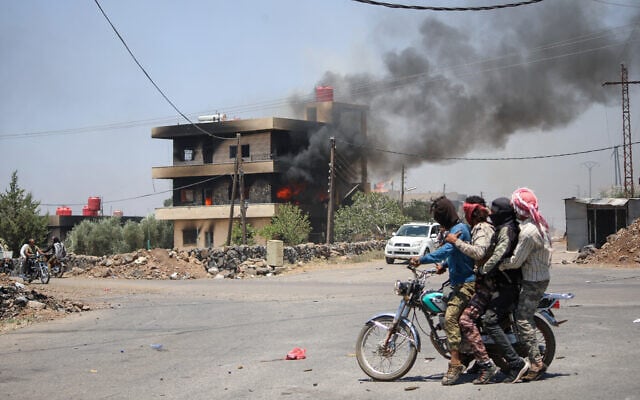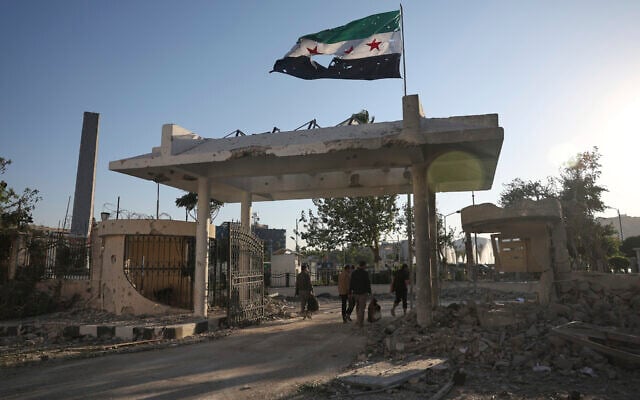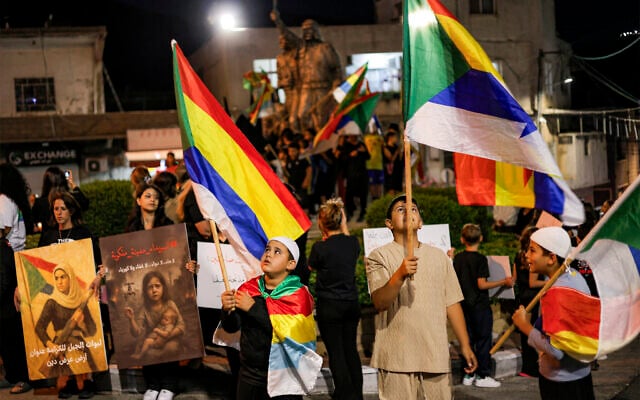Israel is preparing to send medical equipment and medicine to a hospital in the Druze-majority city of Sweida, in southern Syria, after days of violence left an estimated 900 people dead and the medical facility badly damaged, the Health Ministry announced on Saturday.
The announcement came even as fighting persisted across Sweida province since last Sunday, despite the latest attempts from Syria’s Islamist-led government to restore order following a US-brokered deal to avert further Israeli military intervention.
As Druze fighters clashed with Sunni Bedouin tribes, who were later joined by government forces, reports emerged from Sweida of regime forces killing women and boys, looting homes, and shaving Druze clerics’ mustaches. Videos also showed Druze fighters beating captured government forces and posing by their bodies.
Israel launched dozens of airstrikes on convoys of government fighters and struck the Syrian defense ministry headquarters in central Damascus, saying it was acting in support of the Druze, who form a substantial community in Israel and are seen as a loyal minority, often serving in the Israeli military.
In a latest show of support for Syria’s Druze, the Health Ministry said on Saturday evening that Israel’s security forces would deliver medical equipment and medicine to a hospital in Sweida once it has received authorization to do so from all relevant authorities.
“Our brotherhood with the Druze community is well known, but beyond that, we are committed to a ‘covenant of life.’ We cannot stand idly by when members of the community — inside or outside Israel — are in danger,” Health Minister Uriel Buso said.

“This initiative reflects the values that guide Israel’s healthcare system and our longstanding alliance with the Druze community,” said Health Ministry Director General Moshe Bar Siman Tov. “Providing medical assistance to the injured is a moral obligation.”
Fighting persisted across the Sweida province on Saturday, and a war monitor reported toward night that Druze fighters had successfully pushed out rival armed factions and regained control over their city.
The Syrian Observatory for Human Rights monitor said that “tribal fighters withdrew from Sweida city on Saturday evening” after Druze fighters launched a large-scale attack.
Earlier Saturday, an AFP correspondent saw dozens of torched homes and vehicles, and armed men setting fire to shops after looting them.
The Syrian interior ministry announced that internal security forces had begun deploying in Sweida province, and AFP correspondents saw them manning checkpoints, trying to prevent more people from joining the fighting.
By evening, Bassem Fakhr, spokesman for the Men of Dignity, one of the two largest Druze armed groups, told AFP there was “no Bedouin presence in the city.”
Humanitarian corridors
A deal restoring calm between Syria’s Islamist-led government and Israel was announced by Washington early on Saturday Damascus time.
The US point man on Syria, Tom Barrack, said interim President Ahmed al-Sharaa and Prime Minister Benjamin Netanyahu “have agreed to a ceasefire” negotiated by the United States.
Barrack, who is the US ambassador to Ankara, said the deal had the backing of Turkey, a key supporter of Sharaa, as well as neighboring Jordan.
“We call upon Druze, Bedouins and Sunnis to put down their weapons and together with other minorities build a new and united Syrian identity in peace and prosperity with its neighbors,” he wrote on X.
Barrack later held a meeting in Amman with the Syrian and Jordanian top diplomats, during which they “agreed on practical steps to support Syria in implementing the agreement,” the US envoy said in a later post on X.
The US administration, which, alongside Turkey and Saudi Arabia, has forged ties with the Islamist president despite his past links with Al-Qaeda, was critical of its Israeli ally’s recent airstrikes on Syria and had sought a way out for Sharaa’s government.

Sharaa followed up on the US announcement with a televised speech in which he announced an immediate ceasefire in Sweida and renewed his pledge to protect Syria’s ethnic and religious minorities.
“The Syrian state is committed to protecting all minorities and communities in the country… We condemn all crimes committed” in Sweida, he said.
The president paid tribute to the “important role played by the United States, which again showed its support for Syria in these difficult circumstances and its concern for the country’s stability.”
The European Union welcomed the deal between Syria and Israel, saying it had been “appalled” by the deadly sectarian violence of recent days.
France urged all parties to “strictly adhere” to the ceasefire.
But Israel expressed deep skepticism about Sharaa’s renewed pledge to protect minorities, pointing to deadly violence against Alawites as well as Druze since he led the overthrow of longtime leader Bashar al-Assad in December.
In Sharaa’s Syria, “it is very dangerous to be a member of a minority — Kurd, Druze, Alawite or Christian,” Foreign Minister Gideon Saar posted on X.
‘No more room in morgue’
The Syrian Observatory for Human Rights, a Britain-based war monitor, said at least 940 people had been killed in the violence since Sunday.
They included 326 Druze fighters and 262 Druze civilians, 165 of whom were summarily executed, according to the Observatory.
They also included 312 government security personnel and 21 Sunni Bedouin, three of them civilians who were “summarily executed by Druze fighters.”
Another 15 government troops were killed in Israeli strikes, the Observatory said.

Syria’s Information Minister Hamza al-Mustafa on Saturday evening said that after the first phase of the ceasefire, which began on Saturday and involved the deployment of security forces to the province, a second phase would see the opening of humanitarian corridors.
Raed al-Saleh, Syria’s minister for emergencies and disaster management, told state television that “the humanitarian situation is bad” and that convoys were waiting to enter Sweida when “the appropriate conditions” present themselves.

